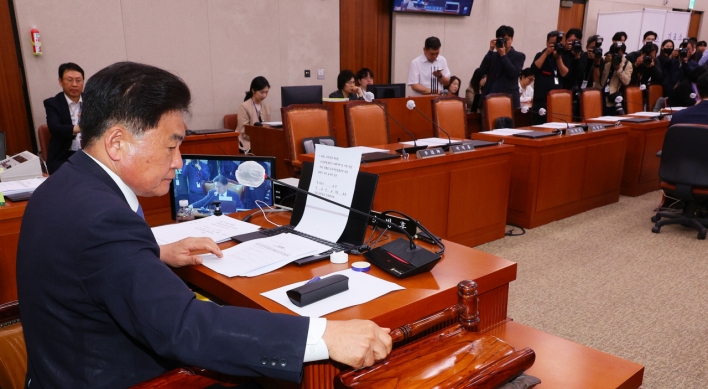China's booming LTE market offers chance for S. Korean firms
By 정주원Published : Feb. 17, 2014 - 10:45
China's market size for the long term evolution mobile network is poised to jump over
five-fold in 2014 on-year, data showed Monday, giving South Korean tech players a rare opportunity in the increasingly saturated global market.
The number of LTE smartphones in China is estimated to reach 135 million units this year, up 547 percent from 2013, according to the data compiled by market researcher Strategy Analytics.
LTE smartphones seized 6 percent of the country's handset market in the first month after the world's No. 2 economy rolled out the latest mobile network service in December. Data put this year's sales estimate for LTE smartphones at 36 percent of the
handset market. By 2015, LTE devices in China will account for nearly half of the market, and in 2018, eight out of 10 handsets will support LTE, the researcher said.
Such growth in South Korea's biggest trading partner will translate into big opportunities for local tech giants like Samsung Electronics and LG Electronics, market watchers say.
Samsung, the world's No. 1 smartphone maker, is to debut its LTE version of the Galaxy S4 and S4 mini in China. The company, however, has not yet been quoted on the official launch date.
It will introduce its next Galaxy line-up, presumably the Galaxy S5, at the Mobile World Congress (MWC) 2014 that opens on Feb. 24 in Barcelona, Spain.
LG Electronics Inc. also aims to tap into the Chinese market with its lineup of phablets, a cross between tablet PCs and smartphones. The firm rolled out its latest phablet, the G Pro 2, on home turf last week.
South Korea's top two tech firms are expected to post an all-time high global market share in smartphones in the first quarter of 2014, separate data by Strategy Analytics showed.
Samsung's portion is projected at 36.2 percent, and its smaller rival LG Electronics is anticipated to record a 5.9 percent share.
It will mark the first time for the top two players to grab more than 40 percent of the world's smartphone market. (Yonhap)
five-fold in 2014 on-year, data showed Monday, giving South Korean tech players a rare opportunity in the increasingly saturated global market.
The number of LTE smartphones in China is estimated to reach 135 million units this year, up 547 percent from 2013, according to the data compiled by market researcher Strategy Analytics.
LTE smartphones seized 6 percent of the country's handset market in the first month after the world's No. 2 economy rolled out the latest mobile network service in December. Data put this year's sales estimate for LTE smartphones at 36 percent of the
handset market. By 2015, LTE devices in China will account for nearly half of the market, and in 2018, eight out of 10 handsets will support LTE, the researcher said.
Such growth in South Korea's biggest trading partner will translate into big opportunities for local tech giants like Samsung Electronics and LG Electronics, market watchers say.
Samsung, the world's No. 1 smartphone maker, is to debut its LTE version of the Galaxy S4 and S4 mini in China. The company, however, has not yet been quoted on the official launch date.
It will introduce its next Galaxy line-up, presumably the Galaxy S5, at the Mobile World Congress (MWC) 2014 that opens on Feb. 24 in Barcelona, Spain.
LG Electronics Inc. also aims to tap into the Chinese market with its lineup of phablets, a cross between tablet PCs and smartphones. The firm rolled out its latest phablet, the G Pro 2, on home turf last week.
South Korea's top two tech firms are expected to post an all-time high global market share in smartphones in the first quarter of 2014, separate data by Strategy Analytics showed.
Samsung's portion is projected at 36.2 percent, and its smaller rival LG Electronics is anticipated to record a 5.9 percent share.
It will mark the first time for the top two players to grab more than 40 percent of the world's smartphone market. (Yonhap)











![[Kim Seong-kon] Democracy and the future of South Korea](http://res.heraldm.com/phpwas/restmb_idxmake.php?idx=644&simg=/content/image/2024/04/16/20240416050802_0.jpg&u=)







![[Today’s K-pop] Zico drops snippet of collaboration with Jennie](http://res.heraldm.com/phpwas/restmb_idxmake.php?idx=642&simg=/content/image/2024/04/18/20240418050702_0.jpg&u=)